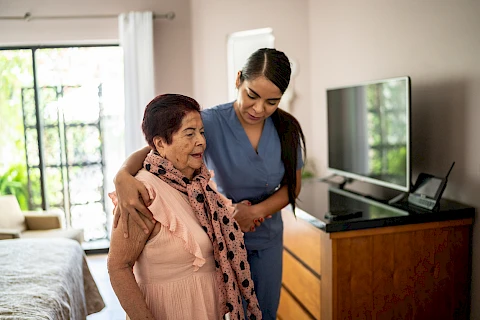
Seniors need to balance independence and safety to ensure their well-being. This can be the key to fulfilling golden years. Our team has a few tips to help guide you through recognizing the need for home care, assessing individual needs, exploring different care options, and how to have this critical conversation with your family.
Recognizing the Need for Home Care
Knowing when it's time to seek additional support can be challenging. Some signs that may indicate a need for home care include:
- Difficulty with daily activities like bathing, dressing, and cooking
- Increased forgetfulness or confusion
- Mobility challenges and a higher risk of falls
- Social isolation and loneliness.
Early intervention is essential in addressing these issues before they escalate. Recognizing these signs early can make a significant difference in maintaining both safety and quality of life.
Assessing Individual Needs
A thorough assessment should be conducted to decide if home care is needed. This can be done either by yourself or with the help of a family member. Consider your physical health and mobility, assessing your ability to perform everyday tasks. Monitor your cognitive health, including memory and understanding. Evaluate your emotional and social well-being, considering your mental and social state. Finally, assess your home environment safety to ensure it's a safe place to live.
Consulting healthcare professionals is highly recommended for a more comprehensive evaluation. They can provide a detailed assessment and offer guidance tailored to your needs.
Exploring Home Care Options
There are different home care services available to suit various needs. Personal care assistance helps with daily activities such as bathing and dressing. Companionship services provide social interaction to reduce loneliness. Specialized care for chronic conditions offers support for specific medical needs like diabetes or Alzheimer's.
Home care offers numerous benefits, including maintaining independence, having personalized care plans, and enhancing overall safety and well-being. These services are designed to support you while allowing you to live in the comfort of your own home.
Having the Conversation with Family
Discussing the need for home care with family members can be sensitive. Approach the topic with sensitivity and empathy, understanding that this can be a difficult subject for everyone involved. Involve seniors in the decision-making process to ensure they feel heard and respected. Address any concerns and misconceptions head-on, providing information to dispel myths and alleviate worries. Lastly, work together to create a collaborative care plan that meets everyone's needs.
Looking for More Help for Seniors at Home?
Balancing independence and safety in home care is essential for a fulfilling life. Recognize the signs that additional support may be needed, assess your situation, and explore available options. Having an open conversation with family members can make the transition smoother.
If you're considering home care services, don't hesitate to contact Senior Helpers Palm Coast. We offer personalized home care services in Palm Coast, Flagler, St. Johns, Volusia County, and St. Augustine to help you or your loved ones maintain independence while ensuring safety. Contact us today to learn how we can support your needs.